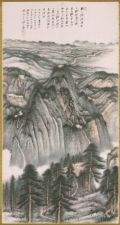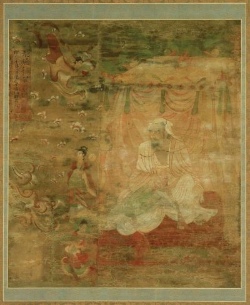The real authentic Zhang Daqian
It was said that young painters in Paris in the early part of the 20th century were scared shitless of impromtu visits by Pablo Picasso. Picasso's uncanny ability to synthesize artistic ideas allowed him to casually pluck the germ of an idea from a young artist and develop it into a whole new style before the young artist's career had barely got started. Picasso's ability to straddle styles was considered peerless in the history of art. Except there is one other who can wrestle that title from Picasso. He is the Chinese painter Zhang Daqian.
 Like Picasso, Zhang was acclaimed
universally for his virtuoso adaptability, ably flitting from style to
style. And like Picasso, he was as much showman as dedicated artisan. He
cultivated the classical chinese image of the great painter, "he had a
convincing and compelling beard that, the story goes, helped him get a
lot of his art collection through customs." recalls Berkeley emeritus
professor James Cahill [1]. But Zhang improves on Picasso in one
particular way – not only was he the greatest painter of his generation,
but he was also the greatest forger of his generation.
Like Picasso, Zhang was acclaimed
universally for his virtuoso adaptability, ably flitting from style to
style. And like Picasso, he was as much showman as dedicated artisan. He
cultivated the classical chinese image of the great painter, "he had a
convincing and compelling beard that, the story goes, helped him get a
lot of his art collection through customs." recalls Berkeley emeritus
professor James Cahill [1]. But Zhang improves on Picasso in one
particular way – not only was he the greatest painter of his generation,
but he was also the greatest forger of his generation.
 Mount Emei of Sichuan, 1953
Mount Emei of Sichuan, 1953
As the saying goes, good artists borrow, great artists steal, but only Zhang Daqian will sell it back to you as the work of an long-dead painter. Born in 1899 in the spice-rich province of Sichuan, Zhang was the consummate classicist with a voracious appetitie to master the styles of the old painters. He threw himself into the study of chinese painting and even disappearing, hermit-like, into the desert for several years, copying 270 ancient cave paintings in Dunhuang in the Gansu province. He earned his reputation as a scholar of classical Chinese painting, a reputation that would come in handy when he would later "unearth" long-lost classic paintings of past masters, some allegedly as old as 590AD. These were snapped by Museums throughout the West and it is said that there is a Zhang forgery in every major Chinese collection in the United States. Dumbass gwei-lo, as one might say. If art is a game of bluff between artists and their necessarily rich patrons, then Zhang is easily the equal of Jeff Koons in playing the game.
 Drinking and singing at
the foot of a precipitous mountain, allegedly by Guan Tongin the 10th
century
Drinking and singing at
the foot of a precipitous mountain, allegedly by Guan Tongin the 10th
century
 Landscape, alleged from the Qing
dynasty.
Landscape, alleged from the Qing
dynasty.
Zhang hated the Communists, leaving China in 1949 and never stepping back onto his homeland. He lived in Brazil and California, before finally settling in Taipei, where he passed away at the age of 83 in 1983. Travelling around the world as the greatest Chinese painter of his generation, he represented a lost generation of chinese painters, as culture in China spasmed under the communists.

Given the evolution of his later paintings, some consider Zhang as a bridge between East and West. In a famous meeting in Paris in 1956, between Zhang Daqian and Pablo Picasso, the two exemplars of the Chinese and European traditions, Picasso allegedly showed Zhang some drawings that he had done in the "Chinese" style. Zhang dryly remarked that they were not executed with the right tools. The quantity of ego at that meeting must have been explosive.
 Early Snow, 1965
Early Snow, 1965
 Peach Blossom Spring,
1983.
Peach Blossom Spring,
1983.
I was moved by Zhang's later works where for all intents and purposes, he had achieved a powerful synthesis of abstract expressionism and chinese painting. There has always been a latent abstraction in chinese painting especially in the art of calligraphy – giving form to the abstraction of writing. Whilst abstract expressionism in the west was the reaction against the intrusion of photography into the european style of neoclassical realism, chinese art never suffered the upheaval from an unhealthy dose of realism. Certainly, Zhang claimed that he was not influenced by Western painting but given a lifetime of copying, assimilation and dissimulation, of course he would say that.
Indeed, the issue of authenticity poses one big cipher in the works of Zhang. Although many American museums were embarassed by the possibility that they had been duped by Zhang, his stature has risen so much that some museums are now exhibiting his fakes as works of Zhang, allowing the stench of forgery to be drowned out by the sweet cologne of postmodernism. Fakeness eventually becomes its own authenticity. Picasso would have wished that he had done that too.
[1]: Boston globe article
[2]: for a sanitized but detailed account of Zhang Daqian: Macao Museum